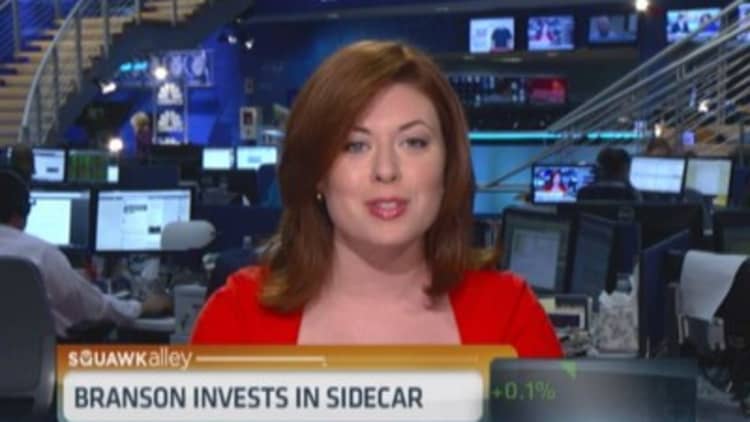
Heaps of cash—and criticism—are being thrown at the darlings of the sharing economy including transportation start-ups. The latest example is San Francisco-based Sidecar, a ridesharing app, which raised $15 million in another round of funding Monday from investors including Sir Richard Branson and Union Square Ventures. That's on top of the more than $20 million it had already raised earlier this year.
Sidecar competes directly with Uber, the transport start-up behemoth, which is valued at more than $18 billion, and its smaller competitor, Lyft, which has raised more than $330 million in funding. Both companies also are headquartered in San Francisco, where the collaborative consumption model among consumers, sometimes called the sharing economy, has taken off.
Sidecar will use the cash infusion to amp up its ridesharing services, said co-founder Sunil Paul, who declined to give the company's total valuation. Sidecar users find other riders and drivers heading in their direction, and connect with one another to cut costs by up to 50 percent compared with Uber, he said.
Paul did acknowledge the broad criticism transport start-ups are facing. While fans laud the companies affordable prices and market efficiency that swiftly connects drivers and passengers via mobile devices, critics point to issues like drivers' insurance and safety records. The start-ups also have faced opposition from taxi groups and local governments.
"I think this is like the early days of e-commerce, when not everyone recognized how big the opportunity was going to be," Paul said. "We are not just chasing the $11 billion spent annually in the U.S. ... We are chasing the more than $1 trillion that people spend on automobiles every year. If you believe what we are doing will only replace taxis, then yes, we are in a bubble."
But Paul and other ridesharing bulls contend the emerging transport business models are poised to alter the transportation space, and get drivers to ultimately evaluate the very need for car ownership. This, as other transportation changes also are on the horizon including driverless cars.
Read MoreRisk in start-ups is 'excessive' right now, says VC

How real is the bubble talk?
But some argue the capital raised by early stage start-ups as a whole is too much money, too soon.
Bill Gurley, partner at venture capital firm Benchmark, which has invested in Uber, said in an interview with The Wall Street Journal published Monday, "I think that Silicon Valley as a whole, or that the venture capital community or start-up community, is taking on an excessive amount of risk right now—unprecedented since '99." CNBC reached out to Gurley, who was unavailable to elaborate.
Despite such risks, transportation start-ups may be too hot to ignore among investors.
Venture capitalists and investors are looking at these start-ups as "me too" requirements for investors to fill their portfolios, simply because they are hot commodities, said Jeremiah Owyang, analyst and founder of Silicon Valley-based Crowd Companies, a brand group on the collaborative economy.
The crowded transport space of new companies likely will shake out to a few players.
"In the end, the market can't sustain this many car-sharing or ridesharing start-ups—there's typically going to be room for three—the most convenient, the cheapest experience and a unique experience," Owyang said. "The heavy amount of funding is needed for hand-to-hand combat with each city government and taxi alliances. The second use of the money is drive acquisition and retention as there's a talent war."
Read MoreWhy Main Street isn't creating jobs
The bulls weigh In
And some experts argue transportation start-ups are not overvalued if you factor in their potential to unhinge traditional transportation companies.
Such start-ups don't have too high a valuation if you look at the big picture, said Stefan Heck, a consulting professor at Stanford University. "The transportation system as a whole is not very well-performing—there is congestion, accidents, $300 billion in economic damage—it's inefficient," Heck said. "There is a demographic shift that's happening."
For example, most owned cars are parked 96 percent of the time, and only 1 percent of the gasoline we buy at the pump is used to move passengers, according to Heck's research.
From a potential investor's viewpoint, Heck said there is a bit of a bubble and some downside. But in the long term, Heck is bullish on the space, and that the valuations are accurate.
"If Uber is in the $15-to-$20 billion range—it's still only one-fourth the valuation of a typical motor OEM" or original equipment manufacturer, Heck said. "And in the future—we will have vehicles that are automated and driverless. It's just replacing the taxi right now, but eventually it will have integration with transit and the replacement will be for the longer haul."
Read MoreInside the shortage of US truck drivers
Fred Wilson, partner at Union Square Ventures and a board member of Sidecar, wrote in a blog post about his confidence in the future of ridesharing, and that Sidecar is a leader. CNBC reached out to Union Square Ventures for further details, but so far has not received a response.
Sidecar founder Paul said he hopes Sidecar will prompt users to consider whether or not they actually need a car. "If these services can start competing with the need to own an automobile—then we are just at the beginning of a massive, massive change," Paul said.
Investor Boris Wertz, founder of Version One Ventures, said he's bullish on transport start-ups because they're taking business from existing players in the taxi industry and are expanding the market by driving down costs for transportation, which will eventually impact car ownership.
"If you believe this thesis, the addressable market all three companies (Uber, Lyft and Sidecar) are going after is actually larger than the taxi industry's market size," Wertz said in an email message to CNBC. "Sidecar has a very differentiated use case—ridesharing has probably the biggest potential to reduce the numbers of cars on the road, and truly leverages the power of the Internet."
The true challenge will be beating its bigger competitors and evolving the ridesharing business model. New services including Lyft Line and UberPool already have emerged, which fill the gap between a hired car and public transportation. Users find other potential riders, using mobile devices, and share the rides.
Added Wertz, "You need a tremendous amount of scale to provide a great experience whenever you pool the rides of different people, so their challenge will be to get to that scale before things like Lyft Line or UberPool take off."
—By CNBC's Kate Rogers


